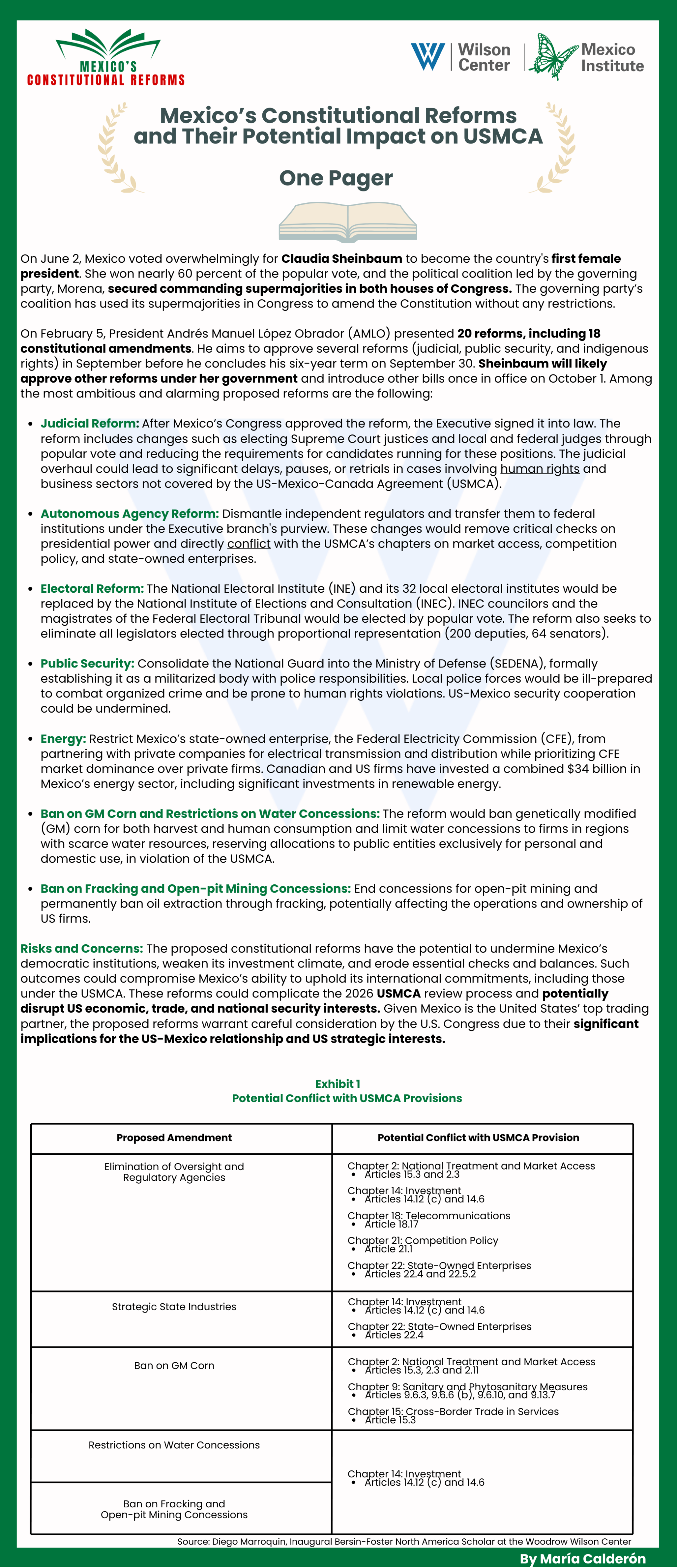On June 2, Mexico voted overwhelmingly for Claudia Sheinbaum to become the country's first female president. She won nearly 60 percent of the popular vote, and the political coalition led by the governing party, Morena, secured commanding supermajorities in both houses of Congress. The governing party’s coalition has used its supermajorities in Congress to amend the Constitution without any restrictions.
On February 5, President Andrés Manuel López Obrador (AMLO) presented 20 reforms, including 18 constitutional amendments. He aims to approve several reforms (judicial, public security, and indigenous rights) in September before he concludes his six-year term on September 30. Sheinbaum will likely approve other reforms under her government and introduce other bills once in office on October 1. Among the most ambitious and alarming proposed reforms are the following:
- Judicial Reform: After Mexico’s Congress approved the reform, the Executive signed it into law. The reform includes changes such as electing Supreme Court justices and local and federal judges through popular vote and reducing the requirements for candidates running for these positions. The judicial overhaul could lead to significant delays, pauses, or retrials in cases involving human rights and business sectors not covered by the US-Mexico-Canada Agreement (USMCA).
- Autonomous Agency Reform: Dismantle independent regulators and transfer them to federal institutions under the Executive branch's purview. These changes would remove critical checks on presidential power and directly conflict with the USMCA’s chapters on market access, competition policy, and state-owned enterprises.
- Electoral Reform: The National Electoral Institute (INE) and its 32 local electoral institutes would be replaced by the National Institute of Elections and Consultation (INEC). INEC councilors and the magistrates of the Federal Electoral Tribunal would be elected by popular vote. The reform also seeks to eliminate all legislators elected through proportional representation (200 deputies, 64 senators).
- Public Security: Consolidate the National Guard into the Ministry of Defense (SEDENA), formally establishing it as a militarized body with police responsibilities. Local police forces would be ill-prepared to combat organized crime and be prone to human rights violations. US-Mexico security cooperation could be undermined.
- Energy: Restrict Mexico’s state-owned enterprise, the Federal Electricity Commission (CFE), from partnering with private companies for electrical transmission and distribution while prioritizing CFE market dominance over private firms. Canadian and US firms have invested a combined $34 billion in Mexico’s energy sector, including significant investments in renewable energy.
- Ban on GM Corn and Restrictions on Water Concessions: The reform would ban genetically modified (GM) corn for both harvest and human consumption and limit water concessions to firms in regions with scarce water resources, reserving allocations to public entities exclusively for personal and domestic use, in violation of the USMCA.
- Ban on Fracking and Open-pit Mining Concessions: End concessions for open-pit mining and permanently ban oil extraction through fracking, potentially affecting the operations and ownership of US firms.
Risks and Concerns: The proposed constitutional reforms have the potential to undermine Mexico’s democratic institutions, weaken its investment climate, and erode essential checks and balances. Such outcomes could compromise Mexico’s ability to uphold its international commitments, including those under the USMCA. These reforms could complicate the 2026 USMCA review process and potentially disrupt US economic, trade, and national security interests. Given Mexico is the United States’ top trading partner, the proposed reforms warrant careful consideration by the U.S. Congress due to their significant implications for the US-Mexico relationship and US strategic interests.
For more information, please visit: https://www.wilsoncenter.org/collection/constitutional-reforms-mexico
Contact information: Maria.Calderon@wilsoncenter.org

Author

Explore More
Browse Insights & Analysis
Distinguished Fellow Carrie Filipetti provides an update on developments in Venezuela

Insights: Ambassador (ret.) Philip Reeker – Europe & the U.S. National Security Strategy

Distinguished Fellow Ambassador David Hale provides analysis on Iran
